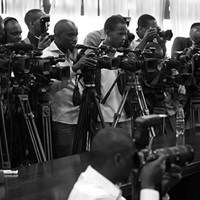All too often, declarations remain simply pieces of paper filed away and forgotten. But the Windhoek Declaration is different, and its impact is still being felt today.

Credit: Article 19 East Africa
In 1991, the winds of change were blowing for a second time after the liberation from colonial rule as many countries in Africa embarked on a path toward more democracy. Until then, efforts at independent, professional journalism had been a rarity and come at a huge price. African journalistic outlets have a history of being reverential of authority in order to protect themselves and remain economically viable.
But the situation has been changing fast, not least thanks to the Windhoek Declaration, which has contributed to changing the media landscape in Africa.
The gathering in Windhoek marked the beginning of a solidarity movement of journalists, editors and media owners and the emergence of media development organisations across the continent.
Catalyst for new organisations
The Media Institute of Southern Africa (MISA), with chapters in 11 countries of the Southern African Development Community (SADC) and which promotes independent and pluralistic media, was formed in 1992.
One of its first projects was an email alert system to make Africa and the rest of the world aware of violations of media freedom as soon as they occurred. Regular conferences were held to share experiences about setting up and maintaining newspapers against all odds.
Similar organisations were initiated in Eastern and West Africa with mixed levels of success. The Media Foundation for West Africa has emerged as a strong sub-regional actor on media freedom advocacy. The Media Institute of Kenya and the East African Media Institute took off but became moribund not long after their infancy. Discussions on forming a global coalition started at the Windhoek conference and the International Freedom of Expression Exchange (IFEX) was established a year later. IFEX is now a worldwide actor on freedom of expression.
The UNESCO conference in 1991 described the Declaration as “a catalyst in the process of encouraging press freedom, independence and pluralism in Africa” and resolved to extend such declarations to other regions of the world.
It also recommended to the United Nations General Assembly that 3 May be declared “International Press Freedom Day”. The UN did so in 1993.
Global impact
The Declaration has left its mark around the world in other ways as well.
In 1992, a UNESCO media conference in Kazakhstan adopted the Declaration of Alma Alta, declaring full support for the Windhoek Declaration and acknowledging its importance as a milestone in the struggle for free, independent media around the world.
The Declaration of Santiago (Chile), in 1994, expressed similar support. Two years later, the Declaration of Sana’a (Yemen) stated that the establishment of truly independent, representative journalists’ associations, syndicates or trade unions and editors’ and publishers’ associations was a priority. Finally, in 1997, the Declaration of Sofia (Bulgaria) urged “all parties concerned that the principles enshrined in this (Windhoek) Declaration be applied in practice”.
The celebrations on the occasion of the tenth anniversary of the Declaration – also held in Windhoek – were used by activists to propose and adopt a new document that would address issues specific to broadcasting, the African Charter on Broadcasting.
The worldwide recognition of the Windhoek Declaration and the solidarity of African journalists made it possible to use both documents as powerful lobbying tools. They kick-started the liberalisation of media laws in Africa and encouraged many journalists to start independent newspapers, for example The Post in Zambia in 1991, MediaFax in Mozambique in 1992 and The Monitor in Malawi in the same year.
The demand for truly public broadcasters has become a common call around the continent – although with mixed success so far. Community radio stations are flourishing in many countries – even though many struggle financially.
The Declaration of Principles on Freedom of Expression, adopted in 2002 by the African Union, was influenced by the spirit of Windhoek. The AU Declaration demanded that “all state and government-controlled broadcasters should be transformed into public-service broadcasters”.
The Windhoek Declaration also informed the Midrand Declaration on Press Freedom in Africa, adopted by the Pan-African Parliament in 2013, as well as the Midrand Call to Action on Media Freedom in Africa, also adopted by the PAP in the same year.
Still wrestling for control
Twenty-five years after Windhoek, there has been some progress regarding media freedom in Africa countries, but an “independent, pluralistic and free press”, as the Declaration demanded, is still far from being a matter of course.
Politicians still want to control the breadth and depth of coverage given to issues. They do this through political edicts, deployment of state advertising, complacency when cronies intimidate and attack journalists, and the forced closure of media houses.
The media still have to tread a very tight rope lest they be accused of being foreign mercenaries or political and economic saboteurs. They can be prosecuted under pre-independence laws that penalise journalists for publication of false news, sedition, insult and/or criminal defamation.
The Midrand Call to Action deplored this state of affairs: “Since the turn of the century the building of democratic institutions in many parts of Africa, and with it the promotion of freedom of expression, has been stagnating, or even regressing.” It accused governments of not living up to the expectations created by documents such as the Windhoek Declaration or the Declaration of Principles on Freedom of Expression.
Is the Windhoek Declaration now just another piece of paper, merely of historical interest? It is not. Given its impact over the last 25 years, its legacy lives on. Windhoek has proven that journalists can come together in solidarity and change the world, at least the media world.
*African Free Press publication by Media Institute of Southern Africa is licensed under a Creative Commons Attribution-ShareAlike 4.0 International License. Based on a work at whk25.misa.org.









